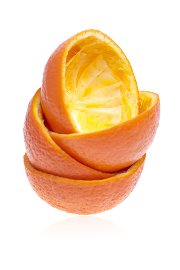New research from London/Ontario in cooperation with the U.S. Department of Agriculature has shown that in hamsters cholesterol can be reduced by about 35% through a diet that contains compounds derived from orange peel.
A development company (KGH Syndergize, London/Ont.) under the lead researcher, Dr. Elzbieta Kurowska (PhD), has identified the active compounds in the peels of oranges or tangerines that are having cholesterol lowering properties. They are a group of substances known under the name of “polymethoxylated flavones” (PMFs) and have the advantage that they have no side-effects. They are naturally occuring and have been part of the food chain that our bodies are used to.
The research results were recently published in the Journal of Agricultural and Food Chemistry, which is a peer-reviewed journal of the American Chemical Society.
The animal and cell line experiments showed that the liver cell metabolism of cholesterol is changed so that bad cholesterol (LDL cholesterol) is lowered, but the good cholesterol (HDL cholesterol) is unaffected. When hamsters were fed a diet with 1% PMFs their LDL blood levels were lowered by 32% to 40%.
The experiments were so successful that there is now a human trial on the way where the longterm effects of PMFs on LDL levels is being followed. Dr. Kurowska cautioned that drinking orange or tangerine juice would be having many beneficial health effects. But in order to get the cholesterol lowering effect that you can achieve with the citrus peel PMF supplement you would have to consume about 20 cups of orange or tangerine juice every day.
Reference: The Medical Post, Vpl. 40 (June 22, 2004): page 18
Last edited December 8, 2012






